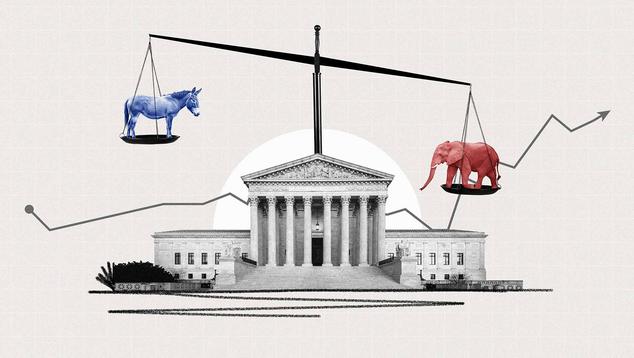Story Highlights
- 43% of Americans say Supreme Court is too conservative, 36% “about right”
- Court’s 42% job approval remains near record low
- Less than a majority trust the judicial branch for fourth straight year
WASHINGTON, D.C. — Forty-three percent of Americans think the current Supreme Court is too conservative. Though that proportion is not meaningfully different from 2022-2024 readings, it is the highest Gallup has measured by one percentage point. The remainder of Americans are more inclined to say the court is “about right” (36%) rather than “too liberal” (17%).
Before the court shifted to a 6-3 conservative advantage after Amy Coney Barrett replaced Ruth Bader Ginsburg in October 2020, no more than 33% had ever characterized it as too conservative. In 2021, the first reading taken after the larger conservative majority was in place, 37% said the court was conservative. That figure increased to 42% after the court issued its Dobbs decision in 2022 that overturned Roe v. Wade and allowed states to impose tighter restrictions or bans on abortions.
The latest results are based on Gallup’s Sept. 2-16 Governance poll, which measures Americans’ attitudes about the Supreme Court and other governmental institutions.
There have been times in the past when elevated percentages of Americans described the court as being “too liberal.” Most notably, in 2015 and 2016, 37% held that view after 2015 rulings that legalized same-sex marriage nationwide and upheld the Affordable Care Act.
In almost all years, except 2022 and this year, a plurality has said the court was about right.
Partisans’ views of the court’s ideology continue to differ: 75% of Democrats and nearly half of independents (46%) believe the court is too conservative, compared with 4% of Republicans. In contrast, most Republicans, 66%, describe the court as being “about right,” while 28% think it is too liberal.
Supreme Court Job Approval at 42%
When asked more broadly about the way the Supreme Court is doing its job, 42% of Americans approve and 52% disapprove. Since 2021, most job approval ratings of the high court have been in the low 40% range, except for a 39% reading in July — the lowest in Gallup’s 25-year trend.
With just a few exceptions, the Supreme Court earned majority approval between 2000 and 2010. Since then, approval only exceeded 50% between 2018 and 2020, when Donald Trump was president and the court had a slim 5-4 conservative majority.
One major reason that approval of the Supreme Court has been lower in the past 15 years is that its ratings have become increasingly split along party lines. In fact, the current 65-point gap in Republican (79%) and Democratic (14%) approval of the court is the largest, by one point over the 64-point gap from July. Those figures compare with an average 22-point party gap between 2000 and 2020.
Republicans’ current job approval rating of the Supreme Court nearly matches the record 80% for the group in January 2001, shortly after the court ruled in favor of Republican George W. Bush in the dispute over the 2000 presidential election outcome. Democrats’ and independents’ ratings are near the lows for each group, both registered in July.
Diminished Trust in Court Persists
Asked how much trust and confidence they have in the judicial branch of the federal government headed by the Supreme Court, 49% say either “a great deal” (16%) or “a fair amount” (33%). That level of trust is among the lowest in Gallup’s trend, essentially matching the low point of 47% from 2022. Meanwhile, 29% of Americans currently say they do not have very much trust in the court, and 22% have none at all.
Trust in the judicial branch did not slip below a majority until 2022. Readings between 1972 and 2020 usually exceeded 60%, including a high of 80% in 1999.
As with the Supreme Court’s approval ratings, trust in the federal judicial branch shows extreme party divisions. Eighty-one percent of Republicans have a great deal or fair amount of trust in the federal judicial system, compared with 23% of Democrats and 44% of independents.
The 58-point trust gap between Republicans and Democrats is 11 points higher than the previous largest gap measured last year.
Democrats’ current level of trust in the judicial branch is the lowest Gallup has measured for any party group in its trend, by one point compared with 2024 and by two points compared with 2022. Trust has exceeded the current 81% figure for Republicans in the past, including 87% for Democrats in 2009 and 86% for Republicans in 2008.
Bottom Line
As the Supreme Court prepares to open its 2025-2026 term, it does so with Americans’ opinions of it near record lows. Much of these depressed ratings are a result of Democrats’ minimal trust in an institution they believe is too conservative. Those opinions reflect both the ideological makeup of the court as well as many recent rulings that have favored Republicans and Republican policy preferences. In contrast, Republicans’ opinions of the court are among the best any party group has had of it historically, clearly indicating that the public views the court as a right-leaning political institution. These attitudes are consistent with past trends in Americans’ views of the court, which have tended to shift in response to the ideological direction of its major rulings.
Stay up to date with the latest insights by following @Gallup on X and on Instagram.
Learn more about how the Gallup Poll Social Series works. View complete question responses and trends (PDF download).




